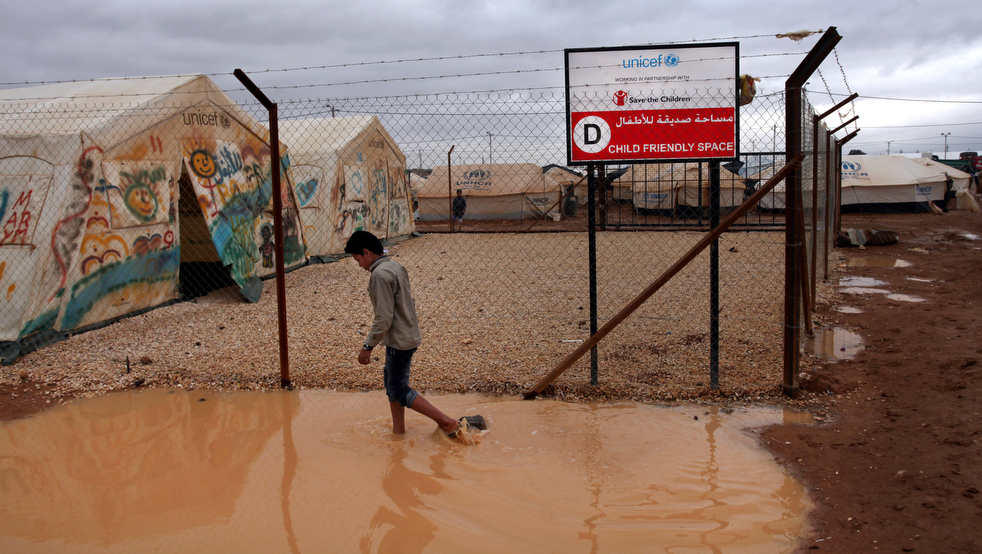 Zaatari Refugee CampNicolas Pelham writes for The New York Review of Books:
Zaatari Refugee CampNicolas Pelham writes for The New York Review of Books:
In a whitewashed apartment in Irbid, Jordan, near the Syrian border, officers who have defected from the Syrian air force are lunching on shakria, chunks of lamb in yoghurt, and performing the Muslim rites that are banned by the Syrian government. They open their meal with a blessing, stroke their newly grown beards, and conclude with the afternoon call to prayer led by Abu Obeyda, a white-bearded Islamist of Palestinian origin, who lost several fingers fighting alongside Osama bin Laden in Afghanistan. When I get up to wash my hands my host rushes to stop me, lest I leave the room before he has verified that his wife or daughters are safely out of view.
Jordanian officials like to distinguish between rebel forces in Syria comprised of tribal fighters and army defectors in the south, who they claim have been carefully vetted with western backing, and more radical fighters backed by Turkey advancing into Damascus from the north. But as the uprising in Syria takes on an increasingly sectarian cast, Jordan has become a crucial center for the Islamist opposition — fighters, regime defectors, and their supporters, who speak of replacing the secular-Alawite regime with a new government that brings a Sunni majority to power. More extremist groups, like Jabhat al-Nasra, an Al-Qaeda affiliate based in and around Aleppo that wants to establish a caliphate, have strengthened their numbers with Jordanian recruits in the south, and are fighting to take the capital first. And while Jordan’s own secular monarchy contends with hundreds of thousands of newly arrived Syrian refugees, it is fearful that the conflict is also creating a powerful cause for its own restless Islamists.
In recent months, Syrian army defectors, almost all of whom are themselves Sunni, have turned to Jordanian mosques for logistical support, ranging from housing for fighters seeking a temporary haven to help returning to Syria with official permission. One renegade Syrian officer told me in November that a thousand rebels recuperating in Jordan, whom he called mujahideen, had already returned to the front, despite having signed Jordanian waivers stating that they were heading home and would not fight. Since then, the numbers have multiplied as the battle against the Assad regime moves to the southern suburbs of Damascus. And though most of the munitions entering Syria come across other borders, a merchant with ties to the well-established Jordanian branch of the Muslim Brotherhood is running guns to groups in southern Syria, according to a Western diplomat.
Despite Jordan’s claims that it is vetting the rebels to keep radicals out, the kingdom has become a prime source for foreign recruits. Abu Muhammad al-Tahawi, a Jordanian Jihadi preacher from Irbid who was jailed in 2005 for plotting to attack Americans and Israelis in the city, claims his followers have sent some 350 fighters into Syria, including some fifty last month alone. While the numbers cannot be verified, Jordanians were on a list of foreign nationals who have joined the rebel cause and been killed in the conflict, according to a list the Syrian government presented to the UN last fall. A new study by the Quilliam Foundation also suggests that Jabhat al-Nasra is highly disciplined and that “Iraqis and Jordanians constitute the main body of foreigners” who have joined its ranks.
All of this has posed a complicated challenge for Jordan’s King Abdullah. Although the King has called for Assad to step down, he also hopes to maintain a more secular order in a new Syria and has long been wary of how the conflict is giving his own Muslim Brotherhood growing clout. For years the Brotherhood has been one of the most organized political forces in the kingdom. And while the movement has remained loyal to the monarchy and worked within the system, its leaders has shown an increasing readiness to challenge royal authority in recent months, as their counterparts in other countries have swept to power. “If the Middle East is going to be run by the Brotherhood, we’re all screwed, and you can kiss moderate Islam goodbye,” a senior government official recently told me.
In an attempt to prevent Syria from turning Islamist, Abdullah has turned to Western powers for help. Citing concern that Syria’s chemical weapons’ stockpiles could fall into the wrong hands, he has welcomed more than a hundred American, British, and French military advisers into Jordan to address this menace, as well as deal with the influx of refugees and help prevent a spillover of the conflict itself. Meanwhile, Jordanian officials have strongly backed Western efforts to replace the Brotherhood-dominated Syrian National Council with a mixed-bag opposition that is inclusive of Alawites and other minorities. Amman has opened its doors to non-Islamist defectors, hosting soldiers, technocrats, and former senior Baathists, including Assad’s former prime minister, Riad Hijab, who defected last August.